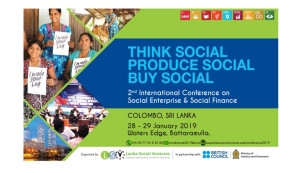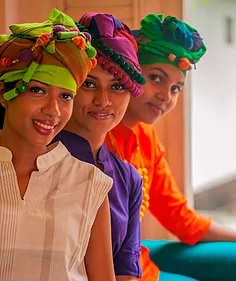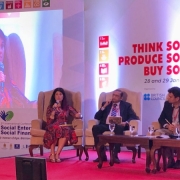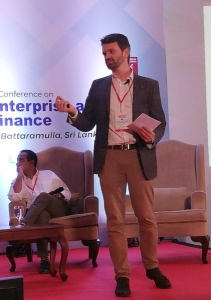Looking outwards – Sri Lanka and beyond…
 In January I was lucky to be invited to Sri Lanka by Lanka Social Ventures, to address the 2nd International Conference on Social Enterprise and Social Finance. It was an amazing and unforgettable experience in so many unexpected ways.
In January I was lucky to be invited to Sri Lanka by Lanka Social Ventures, to address the 2nd International Conference on Social Enterprise and Social Finance. It was an amazing and unforgettable experience in so many unexpected ways.
The conference itself attracted very high profile speakers, such as the Governor of the Bank of Sri Lanka, but as is often the case with conferences, it was the discussions that happened on the side lines that fascinated me. We learnt a lot, even from my whistlestop three day trip!
The need for sustainable business models that will keep addressing the social and environmental challenges faced once the aid agencies inevitably pull out is becoming more pressing.
Firstly, the vibes that I picked up are that the social enterprise movement in Sri Lanka is such an obvious fit for the sustainable development of their economy. The country has gone through so much recent turmoil, with the combination of the civil wars and the devastating Tsunami in 2004. This has made the country relatively aid and donor focused, which brings its own set of challenges. The need for sustainable business models that will keep addressing the social and environmental challenges faced once the aid agencies inevitably pull out is becoming more pressing.
This is where the women-led social enterprises combined with the Fair Trade model come in! I was amazed at the level of co-operation and synergy between these entrepreneurs and business owners. The social enterprise business model fits in so many ways, for instance in addressing the extreme social challenges faced by women trying to earn a living, many of which have to travel to the Middle East to access work.
Having been so well embedded in the Fair Trade world, the Sri Lankan’s completely ‘get’ that there is a need for meaningful external certification/accreditation/ verification.
 Those that stay experience huge challenges finding work that can be combined with the challenges of child rearing, as well as older women, who also find it hard due to cultural constraints. Examples of local social enterprises include Selyn, which is 99% women led and empowers women by giving them flexible working arrangements to make beautiful handloomed products to fit around their family commitments.
Those that stay experience huge challenges finding work that can be combined with the challenges of child rearing, as well as older women, who also find it hard due to cultural constraints. Examples of local social enterprises include Selyn, which is 99% women led and empowers women by giving them flexible working arrangements to make beautiful handloomed products to fit around their family commitments.
I was also very impressed with the way in which all these businesses have come together to develop the Good Market. Led by another impressive female social entrepreneur, Amanda Kiessel, this directory has over 825 ethical businesses, which are mainly social enterprises, based in Sri Lanka and now further afield. It has been very much community-led and is clear about the importance of certifications for all the producers and suppliers, to provide reassurance to buyers.
I encourage you to join it (although most suppliers are currently in Sri Lanka, it is expanding), it uses the Social Enterprise Mark to verify social/environmental impact and is free to apply!
This brings me onto the issue of certification and accreditation. Having been so well embedded in the Fair Trade world, the Sri Lankan’s completely ‘get’ that there is a need for meaningful external certification/accreditation/ verification. Following the conference, I was working with a number of stakeholders to develop ideas for an accreditation for social enterprises. One of the main challenges and issues discussed was ‘How do we ensure that this is robust and that the assessors have credibility too?’
We are the business models of the future and we can prove our credentials by being social impact led, commercially viable and focused on our stakeholders rather than profiteering for shareholders.
My final point is about alliances with the wider new economy movement – i.e. those that want to see genuine changes to the prevailing business models and the importance of credible certification in this mix. Brexit has made us look inwards, which is not healthy. The conference gave me a chance to catch up yet again with the pioneering David Brookes of Social Traders in Australia and the inspiring Erinch Sahan from the World Fair Trade Organisation (he was keynote speaker at our 2018 conference).
In Victoria (Australia), the government has its own social procurement policy, which requires that goods and services are bought from social enterprises. This seems much more robust than our Social Value Act and requires robust certification, which is provided through the Social Traders Mark. It is also clear that the World Fair Trade Organisation is the social enterprise wing of Fair Trade, with its own robust certification of social enterprises in its network.
We must work with these key allies to stand up to the challenges. We are the business models of the future and we can prove our credentials by being social impact led, commercially viable and focused on our stakeholders rather than profiteering for shareholders. As comments at the recent World Economic Forum prove, global corporate behaviour has caused a lot of the trouble we find ourselves in – we therefore need a radical change, not anti- business, but business that shares its wealth much more fairly with all people, not just those select few at the top. This is something we will be addressing at our 2019 conference, which will examine whether growth is always a good thing.
To hear more about social enterprises and Fair Trade in Sri Lanka I would recommend listening to the below WFTO podcast with Erinch Sahan, Amanda from Good Market and Selyna from Selyn.






